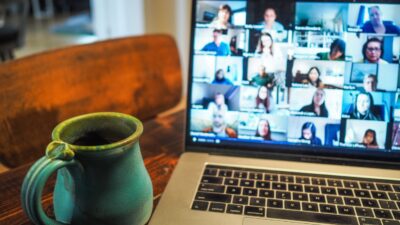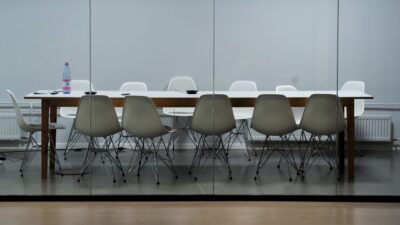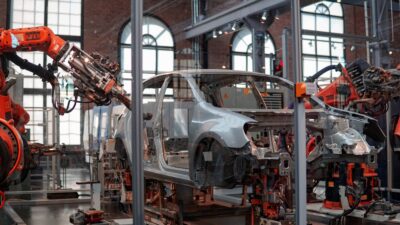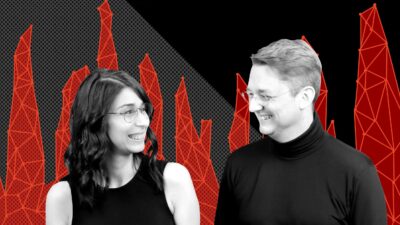Sandra Peter and Kai Riemer
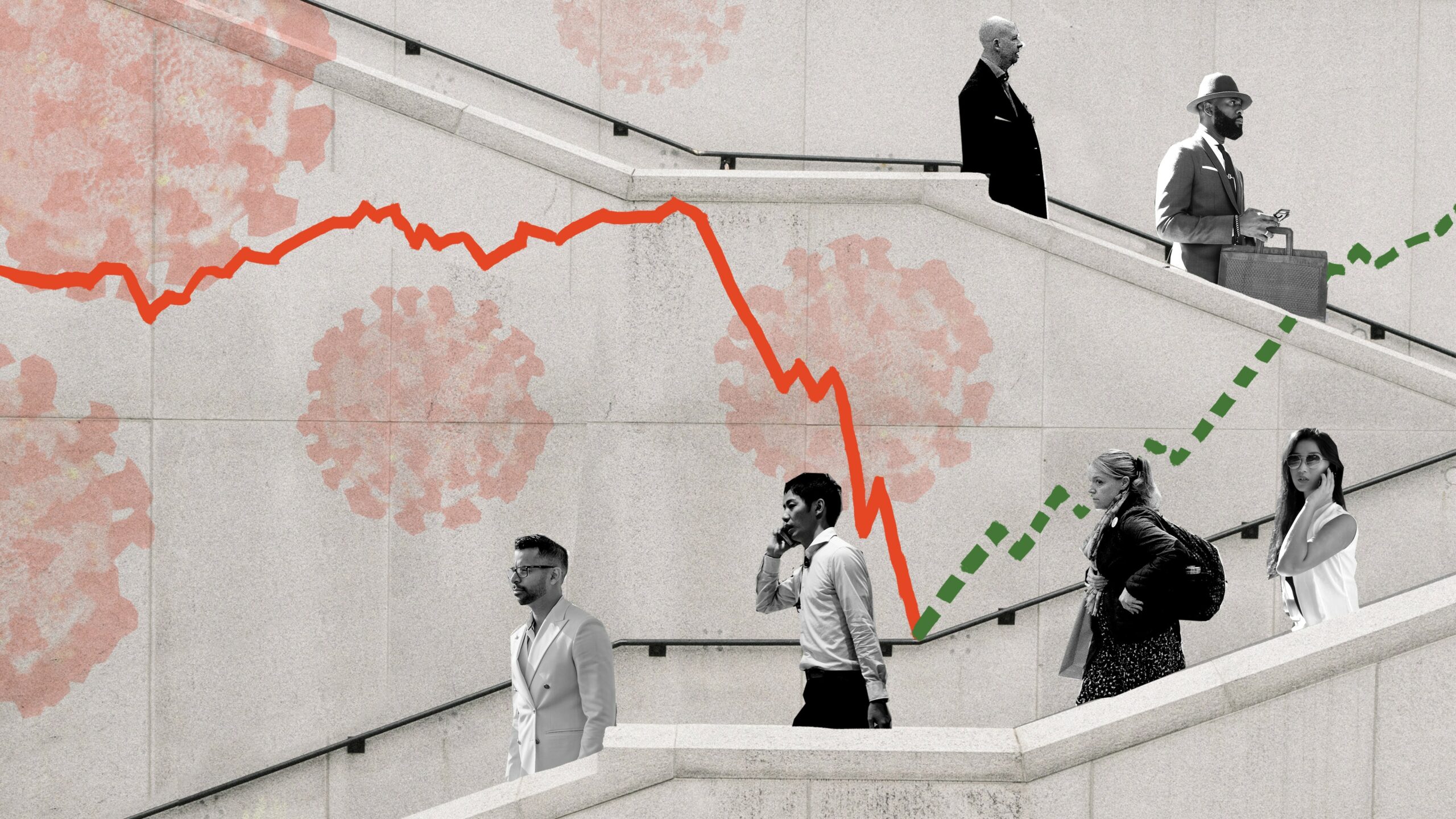
Social capital on Corona Business Insights
Social capital, networking and the office: part four of a series looking at shifting working practices, distributed and hybrid work.
As COVID-19 sets out to change the world forever, join Sandra Peter and Kai Riemer as they think about what’s to come in the future of business.
Shownotes
Our discussion of Zoom fatigue on Corona Business Insights
Beunza and what we lose when we work from home
Our previous episodes of Corona Business Insights on the ideal worker, zoom fatigue, starting a new job remotely, remote meetings, Gen Z and COVID-19, worker motivation, presenteeism and hybrid work, the four-day work week, employee monitoring, corporate surveillance, productivity and remote work, and office changes
What a year of WFH has done to our relationships at work
This episode is part of a podcast series covering what COVID-19 will mean for the business world, where we look at the impact on the economy, businesses, industries, workers and society. This is part of our ongoing coverage of the impact of COVID-19 on the future of business.
Follow the show on Apple Podcasts, Spotify, Overcast, Google Podcasts, Pocket Casts or wherever you get your podcasts. You can follow Sydney Business Insights on Flipboard, LinkedIn, Twitter and WeChat to keep updated with our latest insights.
Send us your news ideas to sbi@sydney.edu.au.
Dr Sandra Peter is the Director of Sydney Executive Plus and Associate Professor at the University of Sydney Business School. Her research and practice focuses on engaging with the future in productive ways, and the impact of emerging technologies on business and society.
Kai Riemer is Professor of Information Technology and Organisation, and Director of Sydney Executive Plus at the University of Sydney Business School. Kai's research interest is in Disruptive Technologies, Enterprise Social Media, Virtual Work, Collaborative Technologies and the Philosophy of Technology.
Share
We believe in open and honest access to knowledge.
We use a Creative Commons Attribution NoDerivatives licence for our articles and podcasts, so you can republish them for free, online or in print.
Transcript
Intro From The University of Sydney Business School, this is Sydney Business Insights.
Sandra And this is Corona Business Insights. I'm Sandra Peter.
Kai And I'm Kai Riemer.
Sandra And we're back on packing the impact of COVID-19 on business, the economy, industry, government, workers and society, and looking at the effects of the pandemic while still in lockdown here in Sydney.
Kai And this podcast is part of a larger initiative by The University of Sydney Business School. And you can still find our COVID business impact dashboard online at sbi.sydney.edu.au/coronavirus.
Sandra And we're back taking a look at where COVID-19 has left us on a range of topics. And today we're having a look at relationships and culture.
Kai And this is part four of a series looking at changes in our work practices and the future of hybrid work. Our previous episodes looked at the move to remote work and the implications for productivity and for wellbeing.
Sandra And since the beginning of the pandemic there have been many conversations around the impact that the pandemic and the move to remote work have had on our relationships at work on our network and our creativity, innovation and our corporate culture. But much like the other topics that we've discussed in this series, we did know quite a bit about the impact of remote work and hybrid work, or indeed in-person meetings, conversations and work on things like relationships or corporate culture or innovation and creativity.
Kai Yeah, it's really interesting because before the pandemic, a lot of the conversations in business around face-to-face meetings have been around ideas creation, innovation, creative work. So the discussion around you know, should people have single offices, or should they be in open plan spaces or activity-based working has always been dominated by the idea of serendipity and people bumping into each other and having those spontaneous ideas.
Sandra And we knew from research before the pandemic that face-to-face meetings, or running into people, serendipity fostered ideas that led to innovation, we also knew that this was beneficial to sharing tacit knowledge, to sharing personal information, to sharing more of ourselves in a work environment, and using that to build relationships and building trust between co-workers in the long-term.
Kai But since the world has been plunged into lockdown last year, and still finds itself in lockdown, it is worth looking at what is actually the role of relationships and culture when it comes to work?
Sandra And it's important to note here that the very beginning of the pandemic, so the first wave, we were all thrust into these remote working arrangements, we still relied on the relationships that we created upfront. And we noted that what we had lost was, you know, some of that serendipity, and that that was being replaced by scheduling, and maybe not everybody was engaged when we were video conferencing, but that things still seem to work. And in the long-term, we will find ways to regain that innovation and creativity that the office would give us. But we're now a year and a half into this long-term experiment, and the conversation around relationship and culture seems to be missing out on a lot.
Kai And so while the conversation is still largely focused on whether and how we can regain the creativity and innovation aspect, as we're now working from home or you know, when people are not all in the office, we want to point out here that when we're all working from home something much more fundamental goes missing that is integral to how we do work in teams as groups as organisations.
Sandra And that has a lot to do with the fact that as Daniel Beunza, a social scientist at Cass Business School in London says, "what we do in offices is not usually what people think we do in offices" And his research from before the pandemic, looking at banks and trading floors, where he pointed out the fact that even in work that has been fully digitised, digital technologies have pretty much taken over finance in the last couple of decades, banks seem to be relying on bigger offices, bigger buildings, bigger trading rooms, and that people seem to be still working in an office even though they could easily do that work remotely or do that work from home.
Kai And interestingly, the shutdown, the lockdown, has afforded the researchers with a natural experiment that allowed them to show that teams who are working face-to-face in front of their computers are more productive, are more successful, have a better performance in trading than when people are working from home trading individually only connected through, say text chat or the phone.
Sandra And it seems would be the case that even when people's work doesn't rely a lot on something that the other person is doing, the sense-making that would occur while people are at work, things like incidental information exchange, or the way young traders or bankers would be socialised in how to think and how to behave as part of a team, those physical experiences were really crucial to the performance of bankers and traders in these environments.
Kai So they point out that it is really about the rituals that form a group, that there is a lot of symbolism and how our team functions when they share the same space. And that the subtle cues that people pick up from each other, the information that people pick up that they didn't actually think they needed, allows them to navigate their job, allows them to navigate the world in much more seamless ways. Something that is hard to recreate or even impossible to recreate in a remote work environment.
Sandra And these insights have been echoed by research that has occurred during the pandemic. And we'll include links in the shownotes to new research from Microsoft, that showed that employees and teams have become much more siloed, since people started engaging in remote work at scale, that connections that people had outside their immediate teams shrunk dramatically, they had fewer opportunities to connect. This also led, of course, to feelings of loneliness and isolation.
Kai And this is really interesting because Microsoft did this research on its electronic Teams platform. So what they were measuring during the pandemic is that even on Teams, communication across organisational units, across silos, have gone backwards and people have shrunk into their silos, or start communicating more along official reporting lines, along the hierarchies. When these technologies should actually be able to enable people to connect with more and diverse groups, which suggests that the relationships that we incidentally form when we're sharing physical spaces are mirrored into the communications that we have in these electronic spaces.
Sandra So the insight here then becomes that the loss of the office is not about the culture of innovation and creativity, but rather that the loss of the office is about our ability to do our work well together.
Kai And this is where we're going to take you to PARIS, which is aspirational, given that we're in lockdown, and we can't really travel.
Sandra But it is a useful acronym for thinking about what working in the same physical space allows us to do. So, PARIS: Problem-solving, Apprenticeships, Relationships, Information discovery, and Sensemaking.
Kai And we're not saying that these things cannot be done at all in remote work environments, but that when you share the same space, these things become much more effortless, sometimes a by-product of the kind of interactions that people have in physical spaces. But certainly, they become much more efficient. Take problem-solving. Problem-solving often occurs outside a particular work task, people problem-solve in the coffee shop, they problem solve in lunch breaks, they can help each other out very quickly when a problem occurs by just shouting across the office or picking up that someone has a problem. Whereas in a remote context, problem-solving might mean to wait for someone to respond or to wait hours in a help desk call.
Sandra Or to have to schedule a meeting, whereas previously, we would have just walked over to someone and sorted it out on the spot. Same thing with apprenticeships, whilst you would previously just grab someone and get them to come to meeting with you, or people would just observe how other people behave in their workspace. So you could see your boss going about their business day or you could see your colleagues problem-solving during the day.
Kai Or pick up how someone mentor someone else, or how people relate to each other. And so in subtle and effortless ways, learn yourself into a profession, into a trade. This becomes much harder when everything relies on scheduled meetings.
Sandra Which brings us to the R in PARIS, relationships. And this is where we will think about networking, building social capital, bringing trust. All of the informal interactions that we have are key to social capital to the benefits we get from, you know, the people we know.
Kai And here we should mention an episode of The Future, This Week we recorded with our colleague and friend Marc Stears from University of Sydney Policy Lab, who gave us a fascinating account of how important face-to-face interactions are for building trust and relationships. And he points out that it's very hard to convey personality, character values when you're on a Zoom call because a lot of these subtle physical bodily cues go missing, and we might get a very skewed impression of someone who we only meet on a screen, which puzzles us when we encounter that person later on-face to-face for the first time, for example.
Sandra Indeed, technology allows us to convey really strong emotions, excitement, or anger or disgust or elation. But it is much more difficult to display values and character, some, like, deeper sense of who we are and what we care about, or what makes us tick. And we do that very easily in everyday interactions, right, all the little things that we just pick up from body language, from the way we just respond to other people or situations around us, from the way we would, you know, share a joke with somebody in a coffee shop queue, or the way we would seize on something that's happening in the world and then have a chat about it or build it into our interactions. So all those aspects of our personality that display our most fundamental values are not about you know, sharing information or working together on a task.
Kai And again, we're not saying that it is impossible to build relationships online or via Zoom or Teams, but it is much harder and takes much more effort. And so what the research at Microsoft showed is that people's networks shrunk, they had fewer relationships, as each relationship takes more effort, more explicit nurturing, people's networks shrink, and the diversity of people they interact with goes backwards. Which of course has detrimental effects for the functioning of the organisation as a whole, because its networks become much less cohesive.
Sandra And again, it's important here to say that this doesn't affect all people equally. Again, young people report more difficulties in building relationships and being engaged at work or networking. And the research from Microsoft also showed that for new employees, this was a particular difficulty because onboarding, networking, training, everything that would just easily occur in a face-to-face setting required much more of them in an online environment and was much harder to reproduce.
Kai Which brings us to the I in PARIS, which is a particular counter-intuitive one, because using electronic media is so intimately associated with information exchange, that it is puzzling why information exchange should benefit so much from working together in the same space. And what we're talking about here is what the Cass researchers refer to as 'incidental information'. The information that we pick up that we didn't know we needed, the discovery of pieces of information that directly help us in doing our work better. But we would never have asked for, we would never have explicitly sought out from other people.
Sandra So this is when you overhear a conversation from someone across the hallway, or someone sitting next to you, or someone...
Kai Someone tells you an anecdote who walks in on you in the coffee shop.
Sandra Even when we work from home, those sorts of situations just don't occur, we just don't stay and listen in on other people's conversations online. We don't run into people when we get our coffee from our kitchen.
Kai Exactly.
Sandra We luckily don't run into people when we go to the bathroom.
Kai Yeah, but seriously, things that come so natural in an office environment would be completely awkward in a remote work environment, and so they completely go missing.
Sandra Which leads to the S in Paris, sensemaking, how we collectively figure out how the world works, how our company works, what to do about events, challenges, problems.
Kai How we make sense of events that have occurred to build a shared understanding, a shared platform from which we see the world as an organisation, so that we don't have to spell things out every time but can draw on this shared understanding in doing our work and having conversations. And the important bit here is that as the networks shrink, as we're going back into our silos, some of the sensemaking still occurs when we have team meetings on Zoom. But the sensemaking becomes more fragmented, there is less sensemaking across silos, there's less sensemaking across diverse groups. And therefore there is less shared understanding that underpins the organisation as a whole, which can lead to misunderstanding, problems and conflicts across those boundaries.
Sandra And again, this is a particular result of being in these exceptional circumstances for such a long time. We're now more than a year and a half into this pandemic, and most of us still, to some extent, work remotely. So when that happens for an extended period of time, that fragmentation becomes more pronounced and becomes a problem.
Kai At the beginning of the pandemic, we were able to draw on the relationships and the social capital, the shared understanding, the sensemaking that already existed pre-pandemic. But as time progresses, it is much harder to create new shared understanding, to maintain those social aspects that make an organisation function. And therefore require more and more explicit attention by the company's leaders, for example, and therefore also more time and effort to nurture these things in an environment that is now not conducive for these PARIS aspects to occur naturally.
Sandra So PARIS, we wish we could go. But we also need to find better ways of appending to problem-solving apprenticeships, relationships, incidental information discovery and sensemaking. And at this point, we would normally go through the moves, you know, you need to be proactive, and make the time to have those informal meetings and encourage other people to do so and be more inclusive and spend more time understanding people. But of course, we also have all the research that has shown that since the pandemic, the number of meetings that we have has gone dramatically up the number of hours that we spend at work has gone dramatically up, so probably not the best solution to say, now you need to spend even more time building these things and building them into your schedule.
Kai So the problem that we're faced with is that we need to spend more time on these activities, we need to devote more attention, more effort to them in an environment that is already plagued by high workloads. And so the only escape valve is likely to be lower workload and some compromising on the all-important productivity equation.
Sandra So likely finding ways to decrease the workload to accommodate for these things. And also making relationships and building of relationships at work a priority.
Kai And as we come out of the pandemic, and transition back into the offices to find that all important mix, that all important hybrid equilibrium between effortless creation of relationships and enabling the PARIS from occurring, and the productivity aspects that might be associated with quiet work in a home environment.
Sandra And let's not forget relationships and culture are just part of the story, hybrid work productivity and wellbeing all matter as we look at still shifting work practices and distributed work.
Kai So this has been part four of a series of episodes looking at changes in our work practices and the future of work post pandemic.
Sandra Check out our previous episodes. And that's all we have time for today.
Kai Thanks for listening.
Sandra Thanks for listening.
Outro From The University of Sydney Business School, this was Corona Business Insights. The podcast that explores the future of business in the wake of the global pandemic.
Sandra Connect with us on LinkedIn, Twitter, WeChat and Flipboard. And subscribe, like or leave us a rating wherever you get your podcasts.
Close transcript

